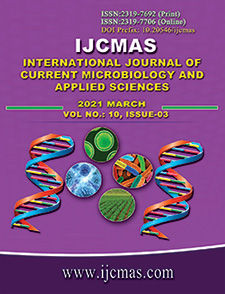


 National Academy of Agricultural Sciences (NAAS)
National Academy of Agricultural Sciences (NAAS)

|
PRINT ISSN : 2319-7692
Online ISSN : 2319-7706 Issues : 12 per year Publisher : Excellent Publishers Email : editorijcmas@gmail.com / submit@ijcmas.com Editor-in-chief: Dr.M.Prakash Index Copernicus ICV 2018: 95.39 NAAS RATING 2020: 5.38 |
Indian Farming system comprising multi-faceted dependence of nature, constraints are inevitable, Constraints in the system of agriculture are natural, which requires utmost care, caution and prevention. An understanding of these constraints will pave way in decision making by every farmer for the prospects and policy maker for further development. Hence an attempt is made to analyse the constraints of Integrated farming system (IFS) in select Agro-Climatic Zones of Karnataka State. The constraints expressed by the respondents in the order of severity were ranked using Garrett ranking technique which is used to find out the most significant constraint to be addressed in the order of priority. The present study was conducted during 2018-19 in the representative districts of selected five agro climatic zones of Karnataka State namely Dharwad-Northern Transitition zone, Tumkur - Central dry zone, Mandya-Southern dry zone, Shimoga-Hilly zone and Udupi-Coastal zone. The perusal of results from the present study revealed the major constraints in order of importance, as expressed by the respondents on the basis of mean score value which included: Lack of remunerative prices for farm produce (84.00), long working hours (76.94), High cost of inputs to take up different farm enterprises (76.84), Lack of marketing facilities and exploitation by middlemen at local level (76.69), Management of subsidiary enterprises like dairy, sheep and goat units. (74.71), Lack of proper access to information and extension services (72.77), Scarcity and high cost of labour (71.78), Monsoon fluctuations affecting production levels. (66.26), Natural resource management, in terms of water conservation and soil health (63.36), Less involvement of Youth in farming (59.66), Problems of wildlife menace, pests & diseases (58.83) and Cultural incompatibility in adopting Livestock a component in integrated farming system (58.49). The policy decisions and measures of Government towards extension initiatives for establishing model farms and organizing the awareness and training programmes on integration of different farm enterprises in one or two locations of each Panchayat union may enable the farmers of that locality to gain first-hand knowledge about various aspects of integrated farming system and help them to overcome the constraints of integrated farming system.
 |
 |
 |
 |
 |